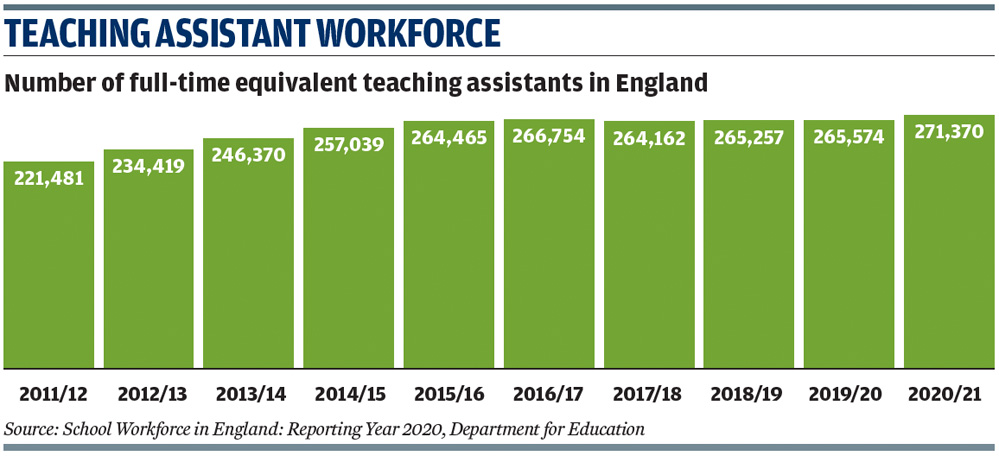
A total of £1bn will support the National Tutoring Programme (NTP), which allows schools to get support from tutors and in-school academic mentors. The NTP will be delivered by tuition and mentoring company Randstad Education from September 2021, supported by Teach First. Academic mentors must have a degree at 2.2 or above or Qualified Teacher Status (QTS), as well as a Level 4 qualification at Grade C or above in GCSE maths and English or equivalent. Academic mentors undergo online training with Liverpool Hope University, which lasts a week for those with QTS and two weeks for those without. Tutors are recruited and trained by tutoring organisations signed up as Tuition Partners.
The government also announced a £253 million investment in expanding teacher training and development for all school teachers in England, including headteachers, but has not given any more details yet. Schools were able to apply this year to receive the Nuffield Early Language Intervention to support children’s early language and literacy skills. This includes free training for teaching assistants and early years educators designed by the University of Oxford and beginning in September 2021.
An £8m government-funded Wellbeing for Education Return programme, starting in September 2021, will train local mental health experts to help school and college staff support student wellbeing.
Teaching assistants
Government figures show the number of full-time equivalent teaching assistants (TAs) in England has increased by around 6,000 since 2019, standing at 271,370. TAs make up 28 per cent of the school workforce and are graded from 1 to 4. The role of higher level teaching assistant was introduced for those who wanted to progress in their career.
No specific qualifications are required to become a first level TA but higher level TAs should hold a nationally recognised qualification at Level 2 or above in English and maths and must meet a set of 33 standards. A Level 3 Teaching Assistant apprenticeship is available. Cache offers qualifications from Level 1 to Level 4 in supporting teaching and learning, while City & Guilds offers Level 2 and 3 qualifications. Students taking the new Level 3 Education and Childcare T-Level can choose to specialise in Assisting Teaching.
Maximising the Impact of Teaching Assistants (MITA) is a programme of school workforce improvement and training delivered by the University College London (UCL) Centre of Inclusive Education. Research carried by MITA and UCL in 2020 found TAs’ workload had increased over the pandemic with 51 per cent managing a whole class or bubble on their own.

SEND
All mainstream schools are required to have a Special Educational Needs Co-ordinator (Senco), responsible for assessing, planning and monitoring the progress of children with special educational needs and disabilities (SEND). Sencos must be qualified teachers. Newly-appointed Sencos without more than a year’s past experience of the role must achieve a postgraduate National Award in Special Educational Needs Co-ordination within three years of appointment.
A May 2021 Ofsted report found some Sencos felt they did not have enough time to carry out their duties and access CPD. A July 2021 report published by Nasen (National Association for Special Educational Needs) and Bath Spa University found 55 per cent of primary school Sencos and 70 per cent of secondary school Sencos said they were not given enough time to complete their role effectively. The research also showed a sharp increase in workload over the pandemic.
The government is carrying out a review of support for children with SEND but publication has been delayed due to Covid. In February 2021, the government announced a £42m extension of projects supporting children with SEND, including improved training for education staff in working with children and young people with specific needs such as autism. From September 2022, 35 new special free schools will employ specially-trained teachers to provide tailored support to up to 3,000 children with SEND. Another two schools will open for children who have been or are at risk of being excluded from mainstream education.
Nasen provides training and support in SEND and inclusion. Membership became free to all UK individuals in January 2021. Nasen offers accredited courses such as a Level 3 and 4 SEND Casework Award and Youth Mental Health First Aid. The Whole School SEND Consortium brings together organisations and individuals who share a commitment to improving the educational experiences and outcomes for children and young people with SEND. Free CPD resources can be found online at The SEND Gateway at www.sendgateway.org.uk.
PSHE
In September 2020, personal, social, health and economic (PSHE) education became compulsory in all state-maintained schools alongside relationships education in primary schools and relationships and sex education in secondary schools. The PSHE Association offers a range of CPD and one-to-one support opportunities.
Other roles
Government funding is available to train to become an educational psychologist. There are 203 funded places available each year until 2022. Since September 2018, every school in England has been required to have a named “careers leader”. The government’s Skills for Jobs strategy, published in January, includes a commitment to invest in more training for careers leaders.

